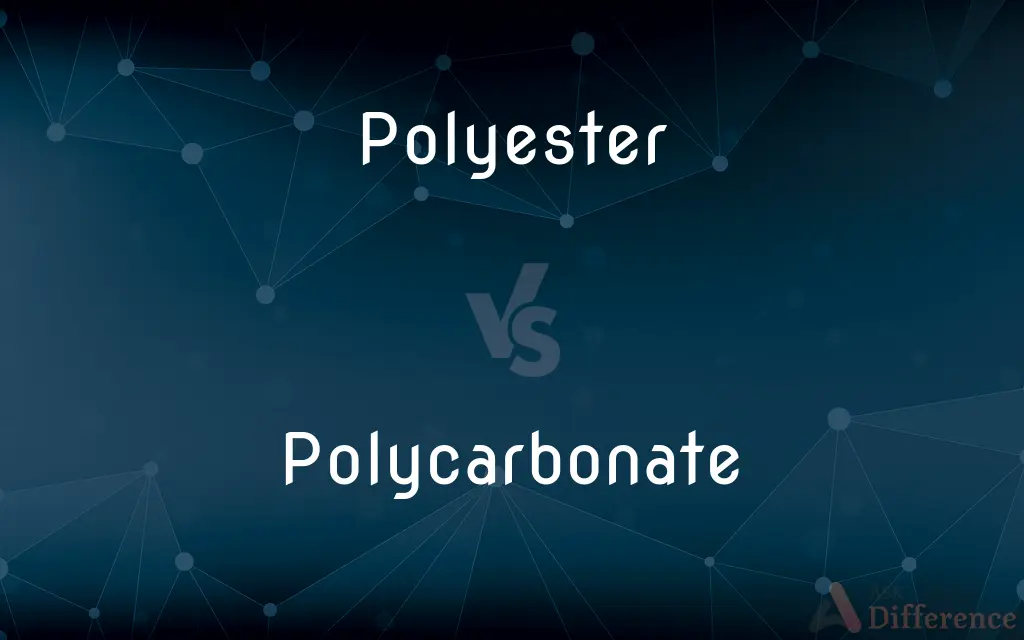Polyester vs. Polycarbonate — What's the Difference?
By Maham Liaqat & Urooj Arif — Updated on March 16, 2024
Polyester is a category of polymers used in fabrics and plastics, known for its durability and resistance to wrinkling, while polycarbonate is a specific type of plastic known for its exceptional strength, impact resistance, and clarity.

Difference Between Polyester and Polycarbonate
Table of Contents
ADVERTISEMENT
Key Differences
Polyester, a versatile polymer, is widely utilized in the textile industry for clothing and home furnishings due to its durability, resistance to wrinkles and shrinking, and ease of care. It is also used in various plastic applications, including packaging and specialty plastics. Polycarbonate, on the other hand, is renowned for its high impact resistance and transparency, making it ideal for use in eyewear lenses, bulletproof glass, and various protective covers.
While polyester fabrics are celebrated for their ability to retain shape and resist environmental stressors like UV rays and moisture, polycarbonate's strength and clarity are unmatched, particularly in applications requiring visual clarity combined with durability, such as in safety glasses and transparent roofing. Polyester's applications in textiles exploit its comfort and aesthetic versatility, whereas polycarbonate is preferred in engineering and safety applications for its physical properties.
On the environmental front, both materials raise concerns regarding biodegradability and recycling. Polyester, particularly in fabric form, can shed microfibers that contribute to water pollution, while polycarbonate, made from bisphenol A (BPA), faces scrutiny over potential health effects. However, recycling and sustainable production efforts are improving the environmental footprint of both materials.
Polycarbonate often has a higher cost associated with its production due to its specialized applications and performance features, such as UV resistance and flexibility under stress, which justify its use in more demanding contexts. Polyester's widespread use in textiles results from its cost-effectiveness and adaptability, making it accessible for a broad range of consumer products.
Despite their shared synthetic origins, the choice between polyester and polycarbonate depends on the application's specific needs: polyester for textile and general-use plastics, and polycarbonate for applications requiring high strength, impact resistance, and clarity.
ADVERTISEMENT
Comparison Chart
Primary Use
Textiles, clothing, packaging
Eyewear, bulletproof glass, CDs
Material Properties
Durable, wrinkle-resistant
High impact resistance, transparent
Environmental Impact
Microfiber pollution, more recyclable
Concerns over BPA, less biodegradable
Applications
Clothing, home furnishings
Safety equipment, medical devices
Cost
Generally lower
Higher due to specialized uses
Strength and Durability
Moderate strength
Exceptionally strong and durable
Clarity
Not applicable
High clarity, used in transparent applications
Resistance
Good resistance to chemicals and UV
Excellent resistance to impact, heat
Flexibility
Flexible, with varying degrees depending on the fabric weave
Naturally flexible, can be molded into various shapes
Compare with Definitions
Polyester
Utilized in both apparel and industrial applications.
Polyester fibers are used in tire reinforcements.
Polycarbonate
A strong, transparent plastic used in safety equipment.
The polycarbonate helmet visor protects against impacts.
Polyester
A synthetic polymer used in fabric and plastic.
The jacket is made of 100% polyester.
Polycarbonate
Resistant to impacts, widely used in eyewear.
Polycarbonate lenses are nearly shatterproof.
Polyester
Known for resistance to wrinkles and shrinking.
Polyester curtains are easy to maintain.
Polycarbonate
Utilized for its clarity in electronics and CDs.
The polycarbonate CD is durable and clear.
Polyester
Durable and quick-drying.
Polyester athletic wear supports performance.
Polycarbonate
Features flexibility for engineering applications.
Polycarbonate's flexibility allows for innovative designs.
Polyester
Can blend with other fibers for diverse textures.
A cotton-polyester blend combines comfort and durability.
Polycarbonate
Concerns over BPA content have led to BPA-free products.
BPA-free polycarbonate bottles are safer for everyday use.
Polyester
Polyester is a category of polymers that contain the ester functional group in every repeat unit of their main chain. As a specific material, it most commonly refers to a type called polyethylene terephthalate (PET).
Polycarbonate
Polycarbonates (PC) are a group of thermoplastic polymers containing carbonate groups in their chemical structures. Polycarbonates used in engineering are strong, tough materials, and some grades are optically transparent.
Polyester
A synthetic resin in which the polymer units are linked by ester groups, used chiefly to make synthetic textile fibres.
Polycarbonate
Any of a group of thermoplastics that are linear polyesters of carbonic acid, especially those derived from bisphenol A and phosgene, characterized by high-impact strength, light weight, and flexibility, and used as shatter-resistant substitutes for glass.
Polyester
Any of numerous synthetic polymers produced chiefly by reaction of dicarboxylic acids with dihydric alcohols and used primarily as light, strong, weather-resistant resins in boat hulls, textile fibers, adhesives, and molded parts.
Polycarbonate
(chemistry) Any of a range of polymers of aromatic carbonates; they are used to make light, flexible alternatives to glass. Abbreviation: PC
Polyester
A wrinkle-resistant fabric of fibers made from any of these resins.
Polyester
Any polymer whose monomers are linked together by ester bonds
Polyester
A material or fabric made from polyester polymer
Polyester
Of, or consisting of polyesters
Polyester
Any of numerous synthetic resins; they are light and strong and weather resistant
Polyester
A complex ester used for making fibers or resins or plastics or as a plasticizer
Polyester
Any of a large class of synthetic fabrics
Common Curiosities
Are both polyester and polycarbonate recyclable?
Yes, both materials can be recycled, but the efficiency and availability of recycling programs vary.
What is the main difference between polyester and polycarbonate?
Polyester is primarily used in textiles and plastics for its durability and ease of care, while polycarbonate is valued for its strength, impact resistance, and clarity in safety applications.
Can polyester be used in place of polycarbonate?
Due to their different properties, polyester and polycarbonate serve distinct purposes and are not typically interchangeable.
Is polyester waterproof?
Polyester is not inherently waterproof but is water-resistant and dries quickly. It can be treated to enhance water resistance.
Which material is more environmentally friendly?
Both have environmental impacts, but efforts are being made to produce and recycle both materials more sustainably.
Can polycarbonate be used in clothing?
Polycarbonate is generally not used in clothing due to its rigid nature and is reserved for applications requiring high impact resistance and clarity.
How do the costs of polyester and polycarbonate compare?
Polycarbonate typically costs more than polyester due to its specialized applications and performance characteristics.
Why is polycarbonate used for bulletproof glass?
Its high impact resistance and clarity make it ideal for protective applications where visibility is important.
Can polyester fabrics release harmful substances?
While generally safe, polyester can shed microfibers that contribute to microplastic pollution in waterways.
Is polyester comfortable to wear?
Yes, polyester can be very comfortable, especially when blended with other fibers like cotton for enhanced breathability.
What advancements are being made in polyester and polycarbonate recycling?
Advances include more efficient recycling methods and the development of bio-based alternatives to reduce dependence on fossil fuels.
How are polyester and polycarbonate made?
Both are synthetic materials derived from petroleum-based compounds, though their chemical structures and manufacturing processes differ.
What are the health concerns associated with polycarbonate?
The primary concern is its bisphenol A (BPA) content, which can leach under certain conditions, raising health concerns.
Can the environmental impact of polyester and polycarbonate be mitigated?
Yes, through sustainable manufacturing, recycling, and the development of eco-friendly alternatives, the environmental impact can be reduced.
Are there BPA-free polycarbonate products?
Yes, there are BPA-free versions of polycarbonate, particularly in food and drink containers, to mitigate health risks.
Share Your Discovery

Previous Comparison
Den vs. Caves
Next Comparison
Modest vs. MinorAuthor Spotlight
Written by
Maham LiaqatCo-written by
Urooj ArifUrooj is a skilled content writer at Ask Difference, known for her exceptional ability to simplify complex topics into engaging and informative content. With a passion for research and a flair for clear, concise writing, she consistently delivers articles that resonate with our diverse audience.















































